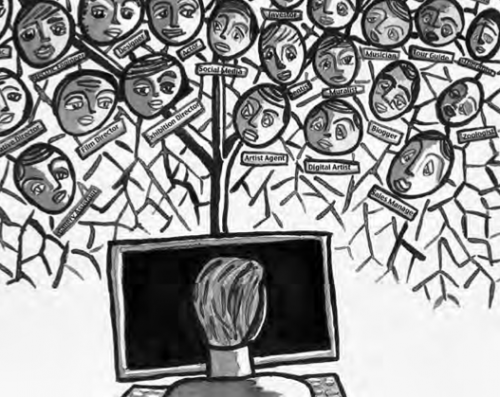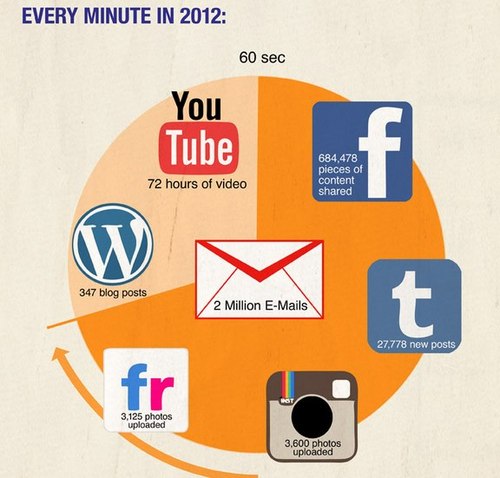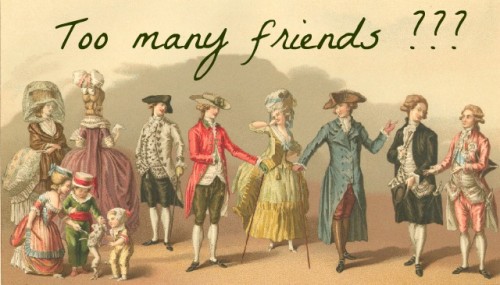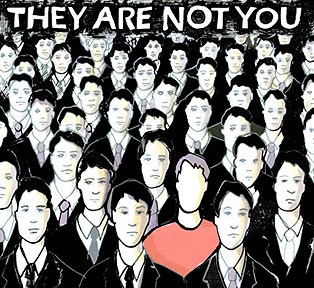(This is the full version of a two-part essay that I posted in October of this year. Here are links to Part I and Part II)
“Well, you saw what I posted on Facebook, right?”
I don’t know about you, but when I get this question from a friend, my answer is usually “no.” No, I don’t see everything my friends post on Facebook—not even the 25 or so people I make a regular effort to keep up with on Facebook, and not even the subset of friends I count as family. I don’t see everything most of my friends tweet, either; in fact, “update Twitter lists” has been hovering in the middle of my to-do list for the better part of a year. And even after I update those lists, I probably still won’t be able to keep up with everything every friend says on Twitter, either.
I feel guilty when I get the “You saw what I posted, right?” question. I feel like a bad friend, like I’m slacking off in my care work, like I’m failing to value my important human relationships. Danah boyd (@zephoria) was talking about something similar in October of this year at “Boom and Bust“—about how social networking sites create pressure to put time and effort into tending weak ties, and how it can be impossible to keep up with them all. Personally, I also find it difficult to keep up with my strong ties. I’m a great “pick up where we left off” friend, as are most of the people closest to me (makes sense, right?). I’m decidedly sub-awesome, however, at being in constant contact with more than a few people at a time.

Anyway, I have a bad case of Social Media Saturation Guilt, and “You saw what I posted, right?” hits that guilt square on its head. Recently, however, I’ve been thinking about how the awkward collisions of online and offline conversation used to run in the opposite direction. Twelve years ago[i] I was on an email list that was basically a private, 70-someodd person pre-Facebook: members shared links, asked questions, had serious conversations, sent invitations to parties, and circulated photos taken at those parties after they happened. It wasn’t uncommon to talk about something someone had posted to “the list” in face-to-face conversation, whether in small groups or at larger events.
Then, over a period of a month or two, most of us on “the list” got on Livejournal, and most of us who had Livejournals started ‘reading’ most of the rest of us who had Livejournals. (Yeah, Livejournal. We’re back in late 2000, remember?)
The affordances of Livejournal being what they are, most of us posted different content to our Livejournals than we did to “the list.” The intersection of Livejournal content and in-person conversation, however, wasn’t as seamless as the intersection of list content and in-person conversation. A new phenomenon popped up that a good portion of “the list” found anywhere from off-putting to downright hurtful, and it looked something like this:
The Scene: a “list” party.
List Member A: Hey, it’s good to see you! What have you been up to recently?
List Member B: [Starts to tell story]—
List Member A: [Cuts off List Member B] Yeah, I know. I read your Livejournal.
These aborted conversations became common enough that they spawned a long, intense debate on “the list” about what should be the proper etiquette for intersections of Livejournal and life-in-the-moment. Some list members felt it was rude and insensitive for friends to cut each other off; other list members felt it was rude and entitled for friends to expect each other to sit through the same story twice. The eventual compromise was to declare a sort of ‘best practice,’ which was that List Member A should signal being caught up with List Member B’s Livejournal by chiming in with a detail from the story: “Oh yeah! But then you found your cat hiding in the wall, right?” List Member B, on the other hand, should truncate the story accordingly: “Yeah! I have no idea how she got in there!”

So how did the Awkward Party Comment shift from “I know, I read your Livejournal” to “You read what I posted on Facebook, right?” There’s a simple explanation, which is that each of us was probably consuming less friend-generated and friend-circulated digital content back then. This could be because those of us on “the list” were just maintaining fewer digital connections in 2000, but there’s also the mode of communication to consider: though some list members juggled multiple different list subscriptions, and Livejournal, and usenet or BBS groups, all of these revolved primarily around text-based communication, and original text takes time to create (something of which I’m particularly aware at the moment, as I write this). When the rate of friend-content production was slower, it was easier to consume most if not all of what our friends produced and circulated.
Yet I don’t think this shift in content production alone explains the shift in social expectation. I think there’s something else in play, which I’m going to call the devolution of friendship. As I explain over the course of this essay, I link the devolution of friendship to—but do not “blame” it on—the affordances of various social networking platforms, especially (but not exclusively) so-called “frictionless sharing” features.
What does “devolution” mean? I’m using the word here in the same way that people use it to talk about the devolution of health care. One example of devolution of health care is some outpatient surgeries: patients are allowed to go home after their operations, but they still require a good deal of post-operative care such as changing bandages, irrigating wounds, administering medications, etc. Whereas before these patients would stay in the hospital and nurses would perform the care-labor necessary for their recoveries, patients must now find their own caregivers (usually family members or friends; sometimes themselves) to perform free care-labor. In this context, devolution marks the shift of labor and responsibility away from the medical establishment and onto the patient; within the patient-medical establishment collaboration, the patient must now provide a greater portion of the necessary work. Similarly, in some ways, we now expect our friends to do a greater portion of the work of being friends with us.
[Obligatory “We” Check: by “we,” here I mean some social media users some of the time. I’m not saying that all social media users’ expectations have shifted in this way, or that any given social media user’s friendship expectations are uniform across different friends, times, or contexts, or that the devolution of friendship applies only to people who use social media. Got it? Ok good.]

Through social media, “sharing with friends” is rationalized to the point of relentless efficiency. The current apex of such rationalization is frictionless sharing: we no longer need to perform the labor of telling our individual friends about what we read online, or of copy-pasting links and emailing them to “the list,” or of clicking a button for one-step posting of links on our Facebook walls. With frictionless sharing, all we have to do is look, or listen; what we’ve read or watched or listened to is then “shared” or “scrobbled” to our Facebook, Twitter, Tumblr, or whatever other online profiles. Whether we share content actively or passively, however, we feel as though we’ve done our half of the friendship-labor by ‘pushing’ the information to our walls, streams, and tumblelogs. It’s then up to our friends to perform their halves of the friendship-labor by ‘pulling’ the information we share from those platforms.
When we think about this form of “bulk sharing” from our perspectives as content-creators and circulators, there are ways in which it seems like a good thing. We’re busy people; we like the idea of making one announcement on Facebook and being done with it, rather than having to repeat the same story over and over again to different friends individually. We also like not always having to think about which friends might like which stories or songs; we like the idea of sharing with all of our friends at once, and then letting them sort out amongst themselves who is and isn’t interested. Though social media can create burdensome expectations to keep up with strong ties, weak ties, and everyone in between, social media platforms can also be very efficient. Using the same moment of friendship-labor to tend multiple friendships at once kills more birds with fewer stones.
There are also ways in which we like being on the “more labor” side of devolution. For instance, sometimes we like the devolution of health care: if we are privileged enough to have people who can perform the necessary care-labor for us, many of us would prefer to recover from surgery in the comfort of our own homes rather than in hospitals. Theorists point out that we provide free labor when we use self-checkout machines at grocery stores and pharmacies, but to some of us that ‘free labor’ is a small price to pay for getting in and out faster, for waiting in a shorter line, and for not dealing with (“dealing with”) another human being at a conventional checkout counter.

Similarly, sometimes we like the devolution of friendship. When we have to ‘pull’ friendship-content instead of receiving it in a ‘push’, we can pick and choose which content items to pull. We can ignore the baby pictures, or the pet pictures, or the sushi pictures—whatever it is our friends post that we only pretend to care about (if we even bother to pretend). Whether we interact through digital media, through the telephone, or through speech in face-to-face conversations, socializing with specific individual friends requires that we mask our disinterest in [babies/pets/sushi/other] by actively ‘smiling and nodding,’ in one form or another. The non-specific sharing of devolved friendship, however, lets us skip this step. We can leave it to everyone else to respond, or tell ourselves that our sushi baby pet friend isn’t really talking to us in particular. Within devolved friendship interactions, it takes less effort to be polite while secretly waiting for someone to please just stop talking.
So if we like devolved friendship from the perspective of both share-producers and share-consumers, what’s the problem? While I won’t go so far as to say they’re definitely ‘problems,’ there are two major things about devolved friendship that I think are worth noting. The first is the non-uniform rationalization of friendship-labor, and the second is the depersonalization of friendship-labor. I explore both below.

The Non-Uniform Rationalization of Friendship-Labor
Social media has rationalized “sharing with friends” to the point of relentless efficiency, but it has not rationalized “being shared with” to the same degree. Instead, the ease of sharing means that we are now bombarded with ‘shared’ information—something Facebook itself has acknowledged with its new “sponsored” status updates, and that some of us acknowledge when we turn off frictionless sharing because we’re concerned about “spamming” our friends. We produce “sharing” at a rate far greater than we can consume it, and we flood the marketplace for attention.
![]() In short, “sharing” has become a lot easier and a lot more efficient, but “being shared with” has become much more time-consuming, demanding, and inefficient (especially if we don’t ignore most of our friends most of the time). Given this, expecting our friends to keep up with our social media content isn’t expecting them to meet us halfway; it’s asking them to take on the lion’s share of staying in touch with us. Our jobs (in this role) have gotten easier; our friends’ jobs have gotten harder.
In short, “sharing” has become a lot easier and a lot more efficient, but “being shared with” has become much more time-consuming, demanding, and inefficient (especially if we don’t ignore most of our friends most of the time). Given this, expecting our friends to keep up with our social media content isn’t expecting them to meet us halfway; it’s asking them to take on the lion’s share of staying in touch with us. Our jobs (in this role) have gotten easier; our friends’ jobs have gotten harder.
Of course, some of our friends might not mind performing more friendship-labor. Their own friends:time ratios might be low, and therefore allow them to keep up with everything we produce and circulate. Other friends might decline to perform the extra friendship-labor we implicitly demand of them, but also not mind maintaining closeness across a more distanced engagement. Still other friends might be ok with the fact that, again and again, we still haven’t seen whatever super-awesome thing of unbelievable awesomeness they posted, even though they posted it on whatever platform a week ago. Regardless, the shift from a “push” model of friendship to a “pull” model is worth noting.
It’s important to note here that, though I talk about our roles as share-producers and as share-consumers, these roles are deeply interrelated. This is because social media is something we prosume, something we both produce and consume in a simultaneous bi-directional feedback loop not unlike the give-and-take of functional friendship. The shares we produce often contain the same content we consumed just moments earlier; even when we generate original content, chances are pretty good we’ll consume some of our friends’ shares while logged in to social media sites to produce our own shares. If any frictionless sharing functions are in play, our content consumption fuels a whole stream of newly-produced share content. Even if we’ve turned off frictionless sharing, and even if we don’t repost anything we consume, our content consumption still produces data through cookies and other online tracking devices, and this data in turn feeds back into the algorithms that shape and structure our social media experiences. Though how much deliberate effort we put into each role may vary, the reality of prosumption is that it’s essentially impossible to engage in either the production or the consumption of social media content without engaging in the other. (Make a mental note of this concept if you don’t already know it, because I’ll reference it again near the end.)

The Depersonalization of Friendship-Labor
The second thing worth noting is that devolved friendship is also depersonalized friendship. Sure, we still send specific messages to specific friends through social media services, through other electronic media like email and text messages, and through non-electronic media; the personalized, hard-to-track shares that take place through email and text message communication (etc) may get called “dark social,” but they’re still social and we’re still engaged in producing them. We also still post things on each other’s individual Facebook walls, and we still send @replies on Twitter. Sometimes we share with specific friends within our generalized broadcasts, perhaps by tagging them in a Facebook status update or by slipping an @mention into the middle of a tweet. These things are not examples of depersonalized friendship. Frictionless sharing and generalized broadcasting, however, do represent depersonalized friendship, because we’re not sharing with any one or more of our friends in particular. Instead we’re sharing generally, with an unknown subset of people who will self-select from whatever potential audience we’ve allowed.
I talked a bit about this difference between “social” and “personal” sharing in an expanded version of my August post about the social music streaming service Spotify. To summarize, I signed up for a free trial of Spotify in order to update my essay, and found that being on Spotify isn’t at all what I’d expected. Given that Spotify is supposed to be “social,” and that near a half dozen people had been pushing me for weeks to start using it, I sort of expected that…you know…being on Spotify would involve experiences that felt like socializing. I imagined Spotify would be like a geographically distributed, digitally-enabled version of the old H3W porch (that’s Historic 3 Wadsworth), where a certain group of my friends used to spend every Monday night listening to—and arguing about—music. Friends, conversations, shared songs, chaotic banter: personal, collective, reciprocal social interaction.
Being on Spotify, however, is not like being on the porch. When you show up on the porch, your friends talk to you. Though a good deal of conversation (and performance) is addressed to the generalized audience of the group, your friends speak to you individually as well[ii]. There will also be times when you, specifically, are called upon to address the group, even before Monday becomes Tuesday and the world’s most wonderfully esoteric word game begins. Even when you are not speaking your friends recognize that you are there, and you recognize that you are there. Everyone on the porch knows that everyone on the porch knows who’s on the porch. The group may be a generalized audience, but it is a specific and mutually recognized generalized audience.

When you show up on Spotify, however, your friends don’t automatically talk to you. They don’t automatically send you notes and songs either, the way I do with my friends via both email and snailmail. You can see when your friends are listening to something (if they scrobble, or have “Spotify Social” enabled), but you have no idea if any of them know you’re there and looking. Scrobbling might be “social,” but it’s not very personal by default.
Personal interaction doesn’t just happen on Spotify, and since I was hoping Spotify would be the New Porch, I initially found Spotify to be somewhat lonely-making. It’s the mutual awareness of presence that gives companionate silence its warmth, whether in person or across distance. The silence within Spotify’s many sounds, on the other hand, felt more like being on the outside looking in. This isn’t to say that Spotify can’t be social in a more personal way; once I started sending tracks to my friends, a few of them started sending tracks in return. But it took a lot more work to get to that point, which gets back to the devolution of friendship (as I explain below).
When I first started poking around on Spotify, I wasn’t at all sure what the behavioral and interactional norms were supposed to be. Clicking on my friends’ listening activity without talking to them felt a bit like rifling through somebody’s CD collection without permission after they’d stepped out to use the restroom—which I recognize some people don’t mind, but which to me feels like something of a transgression. One ‘Spotivangelist’ friend told me that I was being ridiculous, and that scrobbling (frictionless sharing of one’s listening activity) is “donating your taste to a generalized other.” I wasn’t sure I agreed exactly, but I took that one friend’s statement as tacit, blanket permission to start checking out what any of my friends were listening to (without clicking into “private” mode beforehand, and then feeling guilty about it later).

I’ve been thinking since, however, on what it means to view our friends as “generalized others.” I may now feel like less of like “creepy stalker” when I click on a song in someone’s Spotify feed, but I don’t exactly feel ‘shared with’ either. Far as I know, I’ve never been SpotiVaguebooked (or SubSpotified?); I have no reason to think anyone is speaking to me personally as they listen to music, or as they choose not to disable scrobbling (if they make that choice consciously at all). I may have been granted the opportunity to view something, but it doesn’t follow that what I’m viewing has anything to do with me unless I choose to make it about me. Devolved friendship means it’s not up to us to interact with our friends personally; instead it’s now up to our friends to make our generalized broadcasts personal.
Nathan Jurgenson (@nathanjurgenson) has suggested that my awkward feelings about interacting with individual friends as a ‘generalized other’ are a form of cyberasociality [pdf], but I’m not certain I agree with him. I think the key piece in my discomfort, in my inability to read frictionless sharing and generalized broadcasts as friendship-labor (or as “personal social interaction”) in and of themselves, is that these forms lack clear mutual acknowledgement. The problem is that they’re depersonalized, not that they’re digitally mediated. That said, for all the examples of interaction that is both digitally mediated & mutually acknowledged that I can list, I can’t come up with an analogous non-digital form of depersonalized friendship-labor. If depersonalized friendship-labor is in fact unique to digitally mediated interaction, I can’t dismiss ‘resistance to depersonalized friendship as cyberasociality’ as readily as I would like.
In any case, regardless of whether it brings more harms or benefits—and regardless of my (potentially cyberasocial) relationship to it—devolved friendship’s attendant depersonalization deserves attention. When we consider the lopsided rationalization of ‘sharing’ and ‘shared with,’ as well as the depersonalization of frictionless sharing and generalized broadcasting, what becomes clear is this: the social media deck is stacked in such a way as to make being ‘a self’ easier and more rewarding than being ‘a friend.’

Jenny Davis (@Jup83) recently highlighted the incentivization to share with her concept of FOBM, or “fear of being missed.” FOMO, “fear of missing out,” is the anxiety we feel when we can’t keep up with consuming all the share-content our friends produce. Because it is now up to us to turn our friends’ generalized broadcasts into personal interaction, we can never know how many opportunities for connection slip by and are lost when we get behind in sifting through our streams. But again, that sifting takes a lot of work: as Davis says of her experience watching the second Presidential debate without access to Facebook or Twitter, “I wanted to see what everyone was saying, but I also knew that the vast majority of [even the smartest members of my network] would not be saying much of substance.” Davis’s comment is not a snarky remark about her friends, but rather an acknowledgement of the fact that even if she’d had access to Twitter during the debate, she’d have been sorting through a lot of dumb “binders full of women” jokes to get to more substantive conversations about, say, sexism in the workplace.
Fear Of Being Missed, on the other hand, is the anxiety we feel when we can’t produce share-content ourselves. As Davis explains in the comments, FOBM “isn’t that others recognize and lament one’s absence, but rather, that one is skipped over or unseen.” If FOMO is the fear of being excluded and forgotten for failing to consume share-content, FOBM is the fear of being excluded and forgotten for failing to produce share-content. “Interaction begets interaction,” Davis explains. So assuming we want interaction with our friends, how do we go about getting it? On the one hand we can attempt to tackle FOMO, and knock ourselves out sorting through all of our friends’ share-content looking for individual instances of generalized friendship-labor that we can work to personalize. On the other hand, we can attempt to tackle FOBM–and skip the sorting, in favor of letting our friends respond to our own generalized friendship-labor. Obviously the vast majority of us take on both of these tasks, but the latter is a much more efficient way to harvest the attention and acknowledgment we crave.
It’s easy to share, to broadcast, to put our selves and our tastes and our identity performances out into the world for others to consume; what feedback and friendship we get in return comes in response to comparatively little effort and investment from us. It takes a lot more work, however, to do the consumption, to sift through everything all (or even just some) of our friends produce, to do the work of connecting to our friends’ generalized broadcasts so that we can convert their depersonalized shares into meaningful friendship-labor.

We may be prosumers of social media, but the reward structures of social media sites encourage us to place greater emphasis on our roles as share-producers—even though many of us probably spend more time consuming shared content than producing it. There’s a reason for this, of course; the content we produce (for free) is what fuels every last ‘Web 2.0’ machine, and its attendant self-centered sociality is the linchpin of the peculiarly Silicon Valley concept of “Social” (something Nathan Jurgenson and I discuss together in greater detail here). It’s not super-rewarding to be one of ten people who “like” your friend’s shared link, but it can feel rewarding to get 10 “likes” on something you’ve shared—even if you have hundreds or thousands of ‘friends.’ Sharing is easy; dealing with all that shared content is hard.
Obviously there’s a whole lot more to friendship than sharing links, songs, and moving pictures (even if they’re pictures of spinning disco chickens, or of an epic sports catastrophe). But I wonder sometimes if the shifts in expectation that accompany devolved friendship don’t migrate across platforms and contexts in ways we don’t always see or acknowledge. Social media affects how we see the world—and how we feel about being seen in the world—even when we’re not engaged directly with social media websites. It’s not a stretch, then, to imagine that the affordances of social media platforms might also affect how we see friendship and our obligations as friends most generally.
Whitney Erin Boesel does the majority of her generalized broadcasting—and a good deal of specific broadcasting, too—on Twitter: @phenatypical
Someecard image from http://www.someecards.com/birthday-cards/it-would-be-significantly-easier-to-wish
Social media saturation image from http://contexts.org/articles/spring-2012/too-many-friends/
Photo of Antigone in wall heater by Whitney Erin Boesel. Used with permission.
Social media production rates image from http://spectacularoptical.tumblr.com/post/33773042893
Too many friends image from http://cupidscharm.blogspot.com/2012/06/can-you-have-too-many-friends.html
Friend collage image from http://www.nytimes.com/2010/05/30/fashion/30FACEBOOK.html?pagewanted=all
Enough friends image from http://avatar.hq-picture.com/too-many-friends-avatar-36446.html
They are not you image from http://emiliesicons4friends.xanga.com/
Crowd at train station photo from http://lynan.wordpress.com/2012/07/14/what-does-it-feel-like-to-be-lonely/
Blurred people image from http://carlcj.tripod.com/GalleryII/
Boy lost in crowd image from http://www.richwainwright.com/blog/foreign-assignments/borders-barriers-israeli-separation-barrier/attachment/israel0023/
Still from Tideland from http://pj-shadow.blogspot.com/2010_12_01_archive.html

Comments 14
7 stories to read this weekend — Tech News and Analysis — December 22, 2012
[...] Social media and the devolution of friendship: As you sit with your family and friends this holiday week, it might be a good time to reevaluate and rethink online relationships and the meaning they carry. I don’t necessarily agree with the writer, but don’t disagree with her either, for her observations do ring true. [...]
7 stories to read this weekend - Cleantech Reporter — December 22, 2012
[...] Social media and the devolution of friendship: As you sit with your family and friends this holiday week, it might be a good time to reevaluate and rethink online relationships and the meaning they carry. I don’t necessarily agree with the writer, but don’t disagree with her either, for her observations do ring true. [...]
Mein Tag « daniel rehn – digitales & reales — December 25, 2012
[...] mich? Check. Was schrieben die Kontakte in Übersee derweil? Oh, ein toller Essay über die “Devolution of Friendship” durch Social Media, aber wieder so lang. Okay, Zeit aufzustehen und das Menschenkostüm [...]
Tim McCormick — December 26, 2012
> "We produce 'sharing' at a rate far greater than we can consume it,
> and we flood the marketplace for attention."
social-media systems themselves mediate this disparity, though, by controlling the "reach" of shared media. For example, in February, Facebook stated that the average reach, or exposure, for personal posts was 12%
(see http://techcrunch.com/2012/02/29/facebook-post-reach-16-friends/). Similar reach figures have been reported for Twitter.
A user who expects his friends to have seen all his posts just doesn't understand how it works.
So in this sense there is not really a disproportion in sharing and being shared with -- the system handles that. What needs to be examined more, I think is the mechanics and implications of this opaque filtering: how and why it's done and how and why people accept it.
thought dump, december 2012 edition « a few things — December 27, 2012
[...] to leave a few times, but it’s fun to have. In moderation. However, i’ve found several interesting articles about some problems with the shift to digital [...]
Does Facebook Encourage Lazy Friendships? | The Penn Ave Post — December 31, 2012
[...] on December 31, 2012 by Andrew Sullivan As a result of social media, Whitney Erin Boesel fears "we now expect our friends to do a greater portion of the work of being friends with [...]
Notable readings of the day 01/01/2013 « "What Are You Sinking About?" — January 1, 2013
[...] Social Media and the Devolution of Friendship: Full Essay (Pts I & II) » Cyborgology [...]
Why Craigslist Is Not The Revolution » Cyborgology — January 8, 2013
[...] as Facebook makes “sharing” much easier and less time-consuming than “being shared with,” present-day Craigslist (and the affordances of digital technologies generally) makes posting ads [...]
Are we really being more social? « TheAntiSofa — January 9, 2013
[...] Whitney Erin Boesel, Social Media and the Devolution of Friendship: Full Essay (Pts I & II) [...]
Οδυσσέας & "κόκκινο χάπι" κόντρα στο κομμάτιασμα της ζωής μας από Facebook & Twitter | Communication Effect — February 13, 2013
[...] εντυπωσιασμό, άλλα όμως διαθέτουν στοιχεία όπως τούτο εδώ: εξηγεί το μηχανισμό μέσα από τον οποίο το [...]
Freundschaft in Zeiten von Social Media | Schule und Social Media — May 27, 2013
[...] Whitney Erin Boesel beschreibt in einem lesenswerten Essay ein Phänomen, das sie »Devolution« der Freundschaft nennt. Devolution bezeichnet für sie zunächst die Übergabe von Arbeitsschritten an die Empfänger einer Dienstleistung: Vom Einchecken am Flughafen über die Wundpflege bis zum Kassiervorgang im Supermarkt werden immer mehr Arbeitsschritte verschoben. Dasselbe passiere bei Freundschaften. Ein wesentlicher Aspekt freundschaftlicher Kommunikation besteht darin, einander zu erzählen, was man ohne den Freund/die Freundin erlebt hat: Lärmige Nachbarn, Streit mit anderem Freund, Beförderung bei der Arbeit, Städtetrip nach Paris, neues Hobby: Schrebergarten, tolles Rezept ausprobiert. Solche Inhalte kommunizieren nun aber viele Menschen auf sozialen Netzwerken: Die lärmigen Nachbarn erhalten einen Witz auf Twitter, der Streit mit dem Freund wird in einer kryptischen Facebook-Nachricht angedeutet, die Beförderung überall freudig verkündet und mit Likes bedacht, der Städtetrip nach Paris, der Schrebergarten und die Kochkünste fotografiert und gepostet. [...]
Social Media and the Devolution of Friendship | senk9@wp — October 22, 2013
[…] Social Media and the Devolution of Friendship: Full Essay (Pts I & II) » Cyborgology […]
Death and Mediation » Cyborgology — December 30, 2013
[…] I’ve mentioned previously, I’m not great about keeping up with all of my digital communication media (though I am ever […]
Friendship Redefined? - Everyday Gyaan — February 8, 2014
[…] be such an integral part of my life. The level of sharing and authenticity is amazing. Then I read this article and I wonder if we need to redefine […]